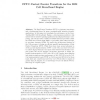Free Online Productivity Tools
i2Speak
i2Symbol
i2OCR
iTex2Img
iWeb2Print
iWeb2Shot
i2Type
iPdf2Split
iPdf2Merge
i2Bopomofo
i2Arabic
i2Style
i2Image
i2PDF
iLatex2Rtf
Sci2ools
122
click to vote
HIPC
2007
Springer
2007
Springer
FFTC: Fastest Fourier Transform for the IBM Cell Broadband Engine
The Fast Fourier Transform (FFT) is of primary importance and a fundamental kernel in many computationally intensive scientific applications. In this paper we investigate its performance on the SonyToshiba-IBM Cell Broadband Engine, a heterogeneous multicore chip architected for intensive gaming applications and high performance computing. The Cell processor consists of a traditional microprocessor (called the PPE) that controls eight SIMD co-processing units called synergistic processor elements (SPEs). We exploit the architectural features of the Cell processor to design an efficient parallel implementation of Fast Fourier Transform (FFT). While there have been several attempts to develop a fast implementation of FFT on the Cell, none have been able to achieve high performance for input series with several thousand complex points. We use an iterative out-of-place approach to design our parallel implementation of FFT with 1K to 16K complex input samples and attain a single precision ...
Cell Processor | Distributed And Parallel Computing | Fast Fourier Transform | HIPC 2007 | Parallel Implementation |
| Added | 07 Jun 2010 |
| Updated | 07 Jun 2010 |
| Type | Conference |
| Year | 2007 |
| Where | HIPC |
| Authors | David A. Bader, Virat Agarwal |
Comments (0)

